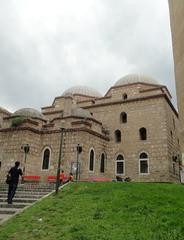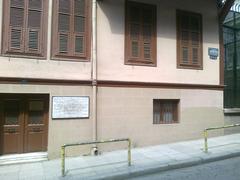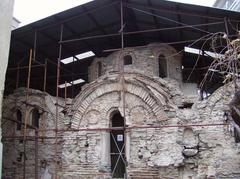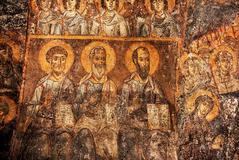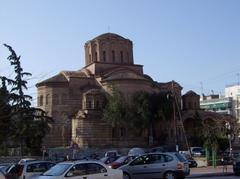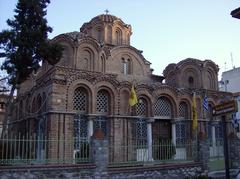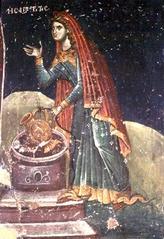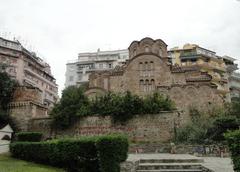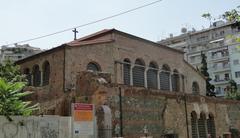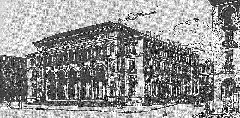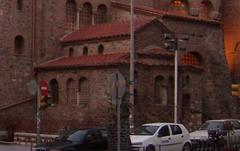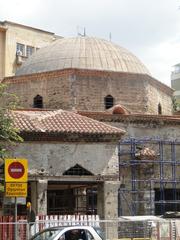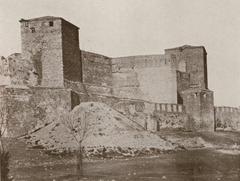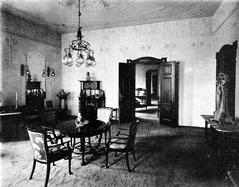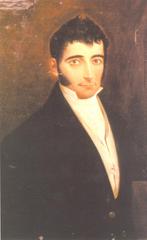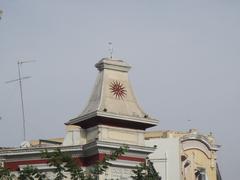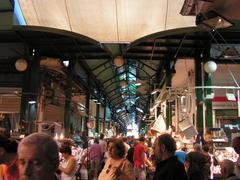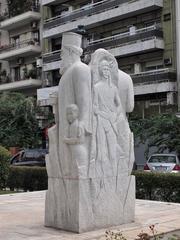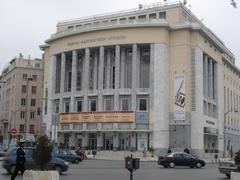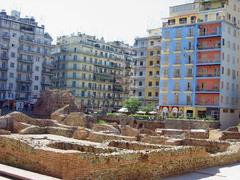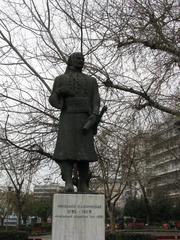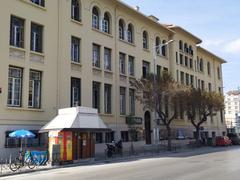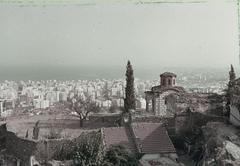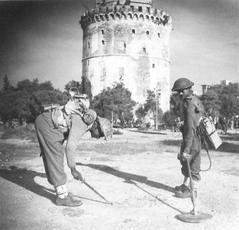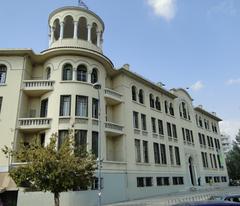Comprehensive Guide to Visiting Νικολάου Πλαστήρα, Thessaloniki, Greece
Date: 24/07/2024
Introduction
Explore the incredible historical and cultural heritage of Thessaloniki, Greece, and learn about the life and contributions of Νικόλαος Πλαστήρας, one of Greece’s most notable figures. This comprehensive guide provides visitors with essential information, including historical insights, visiting tips, and must-see landmarks. Thessaloniki, the second-largest city in Greece, boasts a rich history dating back to its founding in 315 BC by Cassander of Macedon, and its significance is highlighted by its role as a major metropolis during various historical periods (justinpluslauren).
Νικόλαος Πλαστήρας, born on November 4, 1883, in Mοrφοβούνι Καρδίτσας, was a prominent Greek military and political figure known for his bravery and strategic acumen. He earned the nickname ‘Μαύρος Καβαλάρης’ (Black Rider) and had a profound impact on Greece through his military and political careers. His legacy is commemorated in various ways, including the naming of Lake Plastiras in his honor (maxmag).
This guide covers the historical and cultural significance of Thessaloniki, key historical sites, and practical visitor information to ensure a memorable visit.
Table of Contents
- Introduction
- Historical Background of Νικόλαος Πλαστήρας
- Historical Significance of Thessaloniki
- Cultural Heritage
- Modern-Day Thessaloniki
- Visitor Information
- Visitor Tips
- FAQ
- Call to Action
- References
Historical Background of Νικόλαος Πλαστήρας
Early Life and Military Career
Νικόλαος Πλαστήρας, born on November 4, 1883, in Mοrφοβούνι (formerly known as Βουνέσι) Καρδίτσας, was a prominent Greek military and political figure. His father, Χρήστος Πλαστήρας, was a tailor, and his mother, Στυλιανή Καραγιώργου, was a weaver. The family faced significant hardships, especially during the Greco-Turkish War of 1897, which forced them to flee to Πεζούλα, a mountainous village in Νευρόπολη Αγράφων (maxmag).
Military Achievements
Pλαστήρας is best known for his military prowess and leadership during critical periods in Greek history. He earned the nickname “Μαύρος Καβαλάρης” (Black Rider) due to his bravery and strategic acumen. His military career was marked by significant contributions during the Balkan Wars, World War I, and the Asia Minor Campaign. Notably, he played a crucial role in the Battle of Skra-di-Legen in 1918, which was a decisive victory for the Greek forces (larissanet).
Political Career and Contributions
After his military career, Pλαστήρας transitioned into politics, where he continued to serve Greece with distinction. He became the Prime Minister of Greece multiple times, with his terms marked by efforts to stabilize the country during turbulent times. His political career was characterized by his commitment to national independence and social justice. Despite his significant contributions, he remained a controversial figure due to his involvement in various political upheavals, including the coup d’état of 1922 (maxmag).
Legacy and Memorials
Pλαστήρας passed away on July 26, 1953, leaving behind a legacy of dedication to his country. He was buried with state honors, reflecting the high regard in which he was held by the Greek people. His life and achievements are commemorated in various ways, including the naming of Lake Plastiras in his honor. This artificial lake, created by the damming of the Tavropos River, is a testament to his enduring legacy and serves as a popular tourist destination (larissanet).
Historical Significance of Thessaloniki
Thessaloniki, the second-largest city in Greece, is a city rich in history and culture. It has been a significant urban center since its founding in 315 BC by Cassander of Macedon. The city’s strategic location on the Thermaic Gulf has made it a crucial hub for trade and commerce throughout history. Thessaloniki’s historical significance is further highlighted by its role as a major metropolis during the Roman, Byzantine, and Ottoman periods (justinpluslauren).
Key Historical Sites
The Rotunda
One of the most iconic historical sites in Thessaloniki is the Rotunda, which dates back to the early 4th century AD. Originally built as a mausoleum for Emperor Galerius, it was later converted into a Christian church and then a mosque during the Ottoman period. Today, it stands as a testament to the city’s diverse historical influences and is considered one of the oldest Christian churches in the world (justinpluslauren).
The Arch of Galerius
Another significant monument is the Arch of Galerius, also known as Kamara. Erected in 298-299 AD to commemorate Galerius’ victory over the Persians, the arch is adorned with intricate reliefs depicting scenes from the campaign. It serves as a prominent historical landmark and a popular tourist attraction in the city (justinpluslauren).
The Palace of Galerius
Adjacent to the Arch of Galerius is the Palace of Galerius, a sprawling complex that once served as the imperial residence. The ruins of the palace provide a glimpse into the grandeur of the Roman era and are an essential stop for history enthusiasts visiting Thessaloniki (justinpluslauren).
Cultural Heritage
Thessaloniki’s rich cultural heritage is evident in its numerous museums and historical sites. The city’s multicultural history is reflected in its diverse architectural styles, ranging from ancient Greek and Roman to Byzantine and Ottoman influences. Visitors can explore the Archaeological Museum of Thessaloniki, which houses an extensive collection of artifacts from the city’s long history, including items from the Macedonian, Roman, and Byzantine periods (justinpluslauren).
Modern-Day Thessaloniki
Today, Thessaloniki is a vibrant and dynamic city that seamlessly blends its historical past with modern urban life. The city’s waterfront, stretching from the port to the concert hall, is a popular destination for both locals and tourists. It features a mix of green spaces, public art installations, and recreational areas, making it an ideal place for leisurely strolls and cultural exploration (justinpluslauren).
Visitor Information
Visiting Hours and Tickets
- Νικόλαος Πλαστήρας Memorial - Open daily from 9 AM to 5 PM. Ticket price - €5 for adults, €3 for students and seniors.
Accessibility
- The memorial is wheelchair accessible with ramps and elevators available for ease of access.
Visitor Tips
For those planning to visit Thessaloniki, here are some essential tips to ensure a memorable experience:
- Explore on Foot - Thessaloniki’s compact city center makes it easy to explore on foot. Walking tours are a great way to discover the city’s historical sites and vibrant street art.
- Visit Local Museums - Don’t miss the opportunity to visit the city’s museums, such as the Archaeological Museum and the Museum of Byzantine Culture, to gain deeper insights into Thessaloniki’s rich history.
- Enjoy the Waterfront - Spend time along the waterfront, where you can enjoy scenic views, public art, and numerous cafes and restaurants.
- Day Trips - Consider taking day trips to nearby historical sites such as Vergina and Pella, where you can explore the ancient capital of Macedon and the royal tombs (justinpluslauren).
FAQ
Q: What are the visiting hours for the Νικόλαος Πλαστήρας Memorial?
- The memorial is open daily from 9 AM to 5 PM.
Q: Is there an entrance fee to visit Νικολάου Πλαστήρα Square?
- No, there is no entrance fee to visit Νικολάου Πλαστήρα Square. It is a public space accessible to everyone.
Q: Are there guided tours available?
- While there are no specific guided tours for Νικολάου Πλαστήρα Square, visitors can join general city tours that include the square in their itinerary.
Q: Can I find parking nearby?
- Yes, there are several parking facilities available near the city center, making it convenient for those traveling by car.
Call to Action
For more information on Thessaloniki’s historical sites and to stay updated on upcoming events, download our mobile app Audiala, check out our related posts, or follow us on social media.
References
- Justin Plus Lauren. (n.d.). One day in Thessaloniki. Retrieved from https://justinpluslauren.com/one-day-in-thessaloniki/
- Maxmag. (n.d.). Νικόλαος Πλαστήρας. Retrieved from https://www.maxmag.gr/afieromata/nikolaos-plastiras/
- Larissanet. (2023, July 26). Νικόλαος Πλαστήρας: Ο βίος και η πολιτεία ενός μεγάλου άνδρα. Retrieved from https://www.larissanet.gr/2023/07/26/nikolaos-plastiras-o-vios-kai-i-politeia-enos-megalou-andra/
- In.gr. (2020, November 4). Νικόλαος Πλαστήρας: Υπόδειγμα πατριωτισμού και δημόσιας ηθικής. Retrieved from https://www.in.gr/2020/11/04/stories/features/nikolaos-plastiras-ypodeigma-patriotismou-kai-dimosias-ithikis/)
